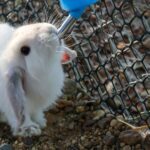Rabbits are lovable pets that can provide endless joy and companionship, but they also naturally tend to chew on objects. Unfortunately, this can lead to dangerous situations, especially when they start chewing on plastics. Plastics are a common household item that can pose a serious health risk to rabbits if ingested.
In this article, we’ll delve into why rabbits strongly desire to chew and explore some of the risks associated with plastic ingestion. We’ll also provide tips and tricks to help prevent your furry friend from chewing on plastics and other harmful objects.
If you’re a rabbit owner, keeping your furry friend safe and healthy is important. By understanding the reasons behind their chewing behavior and taking steps to redirect it, you can help ensure your rabbit lives a happy and healthy life free of plastic-related health issues.
Understanding Why Rabbits Chew on Plastics
Rabbits are natural chewers with a strong instinct to chew on objects to maintain their dental health and relieve boredom. Unfortunately, some rabbits may chew on plastic items, which can be dangerous. There are several reasons why rabbits may be attracted to plastic:
Texture
Some rabbits may find the texture of plastic appealing, especially if it is soft and pliable. They may enjoy the sensation of gnawing on the plastic with their teeth.
Taste
Some plastics contain additives or coatings that may taste sweet or appealing to rabbits.
Boredom
If a rabbit does not have enough stimulation in their environment, they may turn to chewing on plastic items to pass the time.
Nutritional deficiency
If a rabbit is not getting enough fiber in their diet and has malnutrition, they may be more likely to chew on non-food items, including plastic.
Dental problems
Rabbits with dental issues, such as overgrown teeth or malocclusion, may seek out plastic items to help wear down their teeth.
The Risks of Rabbits Chewing on Plastics
Rabbits are known to chew on various objects, including plastics, but this can pose several risks to their health. Here are some of the risks associated with rabbits chewing on plastics:
Gastrointestinal Problems
If a rabbit ingested plastic, it can block its digestive tract, leading to potentially fatal gastrointestinal stasis. This condition can cause symptoms such as loss of appetite, constipation, and bloating.
Choking Hazard
Small pieces of plastic can break off while rabbits are chewing on them, and these pieces can become lodged in their throat, causing choking.
Intestinal Blockages
If rabbits swallow pieces of plastic, it can cause blockages in their intestines, leading to serious health issues and even death.
Tooth Damage
Chewing on hard plastics can cause damage to rabbits’ teeth, leading to pain, infections, and difficulty eating.
Toxicity
Some plastics contain toxic chemicals that can be harmful if ingested by rabbits. These chemicals can cause symptoms such as vomiting, diarrhea, and even organ damage.
Behavioral Problems
If rabbits develop a habit of chewing on plastics, they may be more likely to chew on other non-food items, such as furniture, which can cause damage to the home.
It’s essential to prevent rabbits from chewing on plastics and provide them with safe and appropriate chewing materials to promote their dental health and well-being. If you suspect your rabbit has ingested plastic, immediately seek a veterinarian.
Preventing Rabbits from Chewing on Plastics
Rabbits are notorious for their chewing habits, and plastic objects are no exception. Here are some tips to help prevent rabbits from chewing on plastics.
Provide plenty of safe chewing options
Rabbits need to chew to maintain healthy teeth and gums, so they have plenty of safe and appropriate chewing options, such as hay, untreated wooden blocks, and cardboard boxes. These options can divert their attention away from plastic objects.
Cover or remove plastic items
If you have plastic items around your rabbits’ living area, cover them with a chew-proof material such as metal mesh or remove them if unnecessary. This can eliminate the temptation for rabbits to chew on them.
Use deterrents
You can apply non-toxic, bitter-tasting sprays on plastic items you can’t cover or remove. The unpleasant taste can discourage rabbits from chewing on them. You can also use physical deterrents such as double-sided tape or aluminum foil to make plastic objects less appealing to rabbits.
Limit access
If possible, limit your rabbits’ access to areas with plastic objects. You can use baby gates, pens, or other barriers to prevent rabbits from reaching these areas.
Supervise your rabbits
When your rabbits are out of their enclosure, supervise them closely and redirect their attention to safe chewing options if they start to chew on plastic objects. This can help prevent them from ingesting harmful materials.
Safe Alternatives to Plastics for Rabbits
There are many safe and suitable alternatives to plastics for rabbits. Here are some examples:
- Ceramic bowls: are a durable and easy-to-clean option for providing food and water to rabbits.
- Stainless steel bowls: are another option for providing food and water to rabbits. They are non-toxic, long-lasting, and easy to clean.
- Natural fiber toys: toys made from natural fibers, such as woven grass or hay, are safe and appropriate for rabbits to chew on.
- Untreated wooden toys: are safe and suitable for rabbits to chew on. They can help keep their teeth healthy and provide mental stimulation.
- Paper products: such as paper bags and cardboard boxes, can be used as safe and environmentally friendly toys for rabbits.
- Grass mats: made from natural fibers, such as woven hay or seagrass- can be a comfortable and safe surface for rabbits to rest on.
How to Identify and Treat Health Issues Caused by Plastic Ingestion
If you suspect your rabbit has ingested plastic, seeking veterinary attention immediately is essential. Here are some steps you can take to identify and treat health issues caused by plastic ingestion in rabbits:
Watch for symptoms
Keep an eye out for symptoms of plastic ingestion in your rabbit, such as loss of appetite, constipation, bloating, difficulty eating or drinking, vomiting, diarrhea, sickness, or unusual behavior.
Check for plastic objects
Look around your rabbit’s living area for any plastic objects or pieces that may have been chewed or ingested.
Seek veterinary attention
If you suspect your rabbit has ingested plastic, contact your veterinarian immediately. Your veterinarian can perform a physical exam and diagnostic tests, such as X-rays or ultrasounds, to determine if plastic is present in your rabbit’s digestive system.
Treatment
The treatment for plastic ingestion in rabbits depends on the severity of the case. Surgery may sometimes be necessary to remove the plastic object from the digestive tract. Your veterinarian may also provide medication to relieve symptoms such as pain or gastrointestinal stasis.
Read More: The Ultimate Guide to Taking Care of Rabbits
Key Takeaways
- Rabbits may choose to chew on plastic items because of texture, taste, boredom, nutritional deficiency, and dental problems.
- The dangers that can be imposed when your rabbit chews on plastic include choking hazards, intestinal blockages, tooth damage, toxicity, and behavioral problems.
- Some tips to help prevent rabbits from chewing on plastics includes providing plenty of safe chewing options, covering or removing plastic items, using deterrents, limiting access, and supervising your rabbits.
- It’s important to note that not all materials are safe for rabbits, and some may cause harm or injury. Always check with a veterinarian or rabbit expert before introducing new materials to your rabbit’s environment.
- Some steps to identify and treat health issues caused by plastic ingestion in rabbits are to watch for symptoms, check for plastic objects, and seek veterinary attention and treatment.
- Prevention is the best way to avoid health issues caused by plastic ingestion in rabbits. Providing safe and appropriate chewing options, limiting access to plastics, and supervising your rabbits closely can help prevent plastic ingestion.


